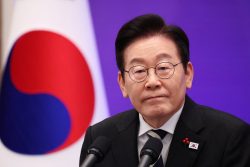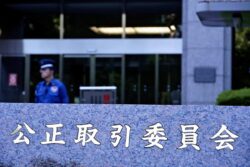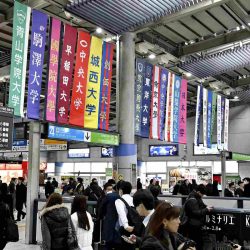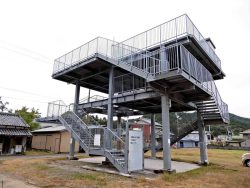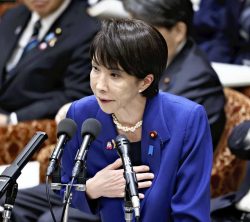Japan’s ruling LDP Split over Calls to Reform Its Factions; Party Faces Hard Sailing toward Funds Transparency
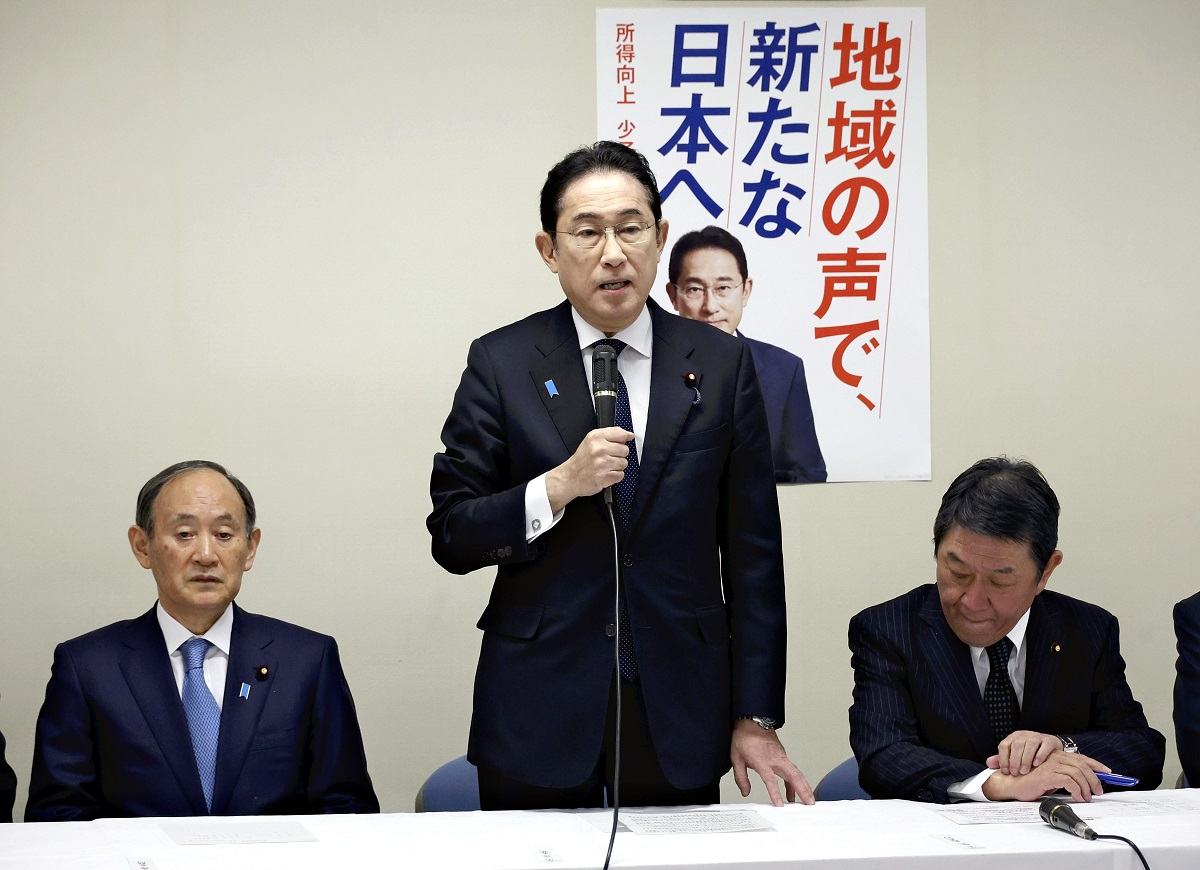
Prime Minister Fumio Kishida speaks at the inaugural meeting of the Liberal Democratic Party’s political reform headquarters on Thursday.
18:57 JST, January 12, 2024
Prime Minister Fumio Kishida has his work cut out as he seeks to reform the faction system that dominates his Liberal Democratic Party. Key members of the ruling party are split on whether the changes are even desirable.
Discussions at the political reform headquarters established by Kishida in the wake of a political fundraising party scandal that has tarred several of the party’s factions likely will focus on reforming the groups and revising the Political Funds Control Law. However, resistance against such bold reforms remains significant within the party, and Kishida’s leadership is sure to be tested as he tries to get his fellow party members onboard.
Former Prime Minister Yoshihide Suga has long insisted that the LDP should get rid of its factions, and he remains steadfast in this view.
“Some people give up on the LDP simply because we have factions,” Suga, who is not affiliated with any faction, told reporters after the headquarters’ inaugural meeting Thursday. “We need to eliminate these factions.”
Several other unaffiliated LDP members echoed Suga’s sentiments. “I said that I think it would be good to get rid of factions,” former Environment Minister Shinjiro Koizumi told reporters after the meeting.
Their view was not shared by LDP Secretary General Toshimitsu Motegi. At the start of the meeting, Motegi tried to check demands for the factions to be abolished. “Factions are where lawmakers can discuss and examine policies, and they complement the party by playing a role in educating young lawmakers and nurturing human resources,” Motegi said.
About 80% of the LDP’s Diet members belong to a faction, and these lawmakers strongly expect their factions to provide information and mutual support in elections. A veteran lawmaker in the faction headed by Kishida scoffed at the calls for factions to be abolished. “Even if unaffiliated lawmakers reject factions, their arguments aren’t convincing,” the lawmaker said.
Momentum lacking
Kishida, who also is LDP president, had a clear message for attendees at Thursday’s meeting. “I want you to deepen discussions on creating rules for policy groups,” Kishida said, referring to factions.
Kishida wants to establish party regulations on the management of factions, which have essentially been allowed to operate as they please. Among the options Kishida has in mind to prevent factions from forming hidden funds is establishing an entity to audit the income and expenditures for factions’ political fundraising parties. Another plan would prohibit kickbacks of money from party ticket sales in excess of a lawmaker’s sales quota.
But there is little real momentum within the LDP for fundamental reforms. “The latest scandal was a matter involving illegal acts by the Abe faction and other factions. It’s not, in essence, due to a harmful effect from factions,” one LDP member told The Yomiuri Shimbun, sharing a view widely held inside the party.
Kishida himself reportedly feels a strong attachment to his own faction known as the Kochikai group. He has spoken about the need to return factions to their origins as “policy groups,” and apparently favors an overhaul of the current situation in which factions focus on raising money and securing prime posts for their members. Even among the party’s executives, such as Motegi and Deputy Prime Minister Taro Aso, who both lead their own faction, most seem to support keeping factions.
The headquarters aims to compile an interim report before the end of this month, but this timeline already has stoked some skepticism. “There’s so little time, and I think it’ll be difficult to put forward any significant plans,” one observer said. Suga also confided to close aides his concerns that the headquarters’ next meetings “likely will end up being a meaningless game.”
Empty promises
Since the 1960s, the LDP has publicly trumpeted the idea of dissolving factions each time a political corruption scandal has stained the party. However, the factions have bounced back each time, such as by rebranding themselves as “policy groups.”
A political reform outline that the party put together in 1989, after the Recruit bribery scandal, and a 1992 basic plan on political reforms both included proposals for change, such as ensuring the prime minister (the LDP president), cabinet ministers and the party’s three key executives were unaffiliated with a faction, and prohibiting factions from making recommendations for the appointment of key personnel. However, these plans were in the end stripped of all substance. Attention now will focus on whether such party agreements will be seriously considered during future discussions by the headquarters.
The success — or failure — of these reforms could affect the political fate of Kishida, whose term as LDP president expires in September. In 1993, then Prime Minister Kiichi Miyazawa insisted he would carry out political reforms. “I’ll do it,” Miyazawa said. “I’ve never said a lie.” Despite this, Miyazawa was unable to pass the relevant legislation. He was forced to dissolve the House of Representatives, and the LDP lost its majority in that year’s election.
A senior LDP official described the delicate balancing act facing Kishida. “If the reforms don’t go far enough, he’ll get blasted by the public. But if he comes out with all guns blazing, he won’t be able to get the whole party behind him,” the official said. “A difficult decision awaits the prime minister.”
Rough sailing to transparency
At Thursday’s meeting, Motegi said the party “would consider necessary legislation to improve the transparency and openness of political funds and also to establish a stricter accountability system.”
With headwinds against the LDP intensifying over its political funds scandal, a majority of party members have come to see law revisions as inevitable. Future discussions will likely center on ensuring transparency of political funds and stricter penalties.
To ensure transparency, a proposal has emerged to lower the legal threshold for mandatory reporting of names and other information of those buying party tickets from ¥200,000 to ¥50,000.
In past law revisions, the threshold for disclosing such information about donors to political groups and elsewhere was set at more than ¥50,000, but requirements for party tickets have been more lax.
“It would be more natural for the standards to be uniform,” a senior LDP official said.
Komeito, the LDP’s coalition partner, has been calling for parties to disclose how they use policy activity expenses, which are donations from political parties to their members. Kishida and Motegi have also suggested party-level measures that do not involve legal reform, in which ticket payments would be allowed only via bank transfer.
Regarding penalties, Komeito has called for introducing a guilt by association system, in which lawmakers would also be held accountable if their treasurers violate the law, and opposition parties hold similar views. However, the LDP has taken a cautious stance, arguing, “Politicians cannot check accounting in detail.”
The Constitutional Democratic Party of Japan and the Japanese Communist Party are calling for a ban on corporate and group donations as well. Kishida has said that the government would reach a conclusion on law revisions after discussions among the ruling and opposition parties, and he hopes to gain broad party consensus in an ordinary Diet session, though rough sailing is expected.
"Politics" POPULAR ARTICLE
-

Japan to Support Central Asian Logistics Route That Bypasses Russia, Plan to Be Part of Upcoming Summit in Tokyo
-

Japan to Tighten Screening of Foreigners’ Residential Status by Providing Information of Nonpayment of Taxes
-

Chinese, Russian Bombers Flew Unusual Path by Heading Toward Tokyo; Move Likely Meant to Intimidate Japan
-
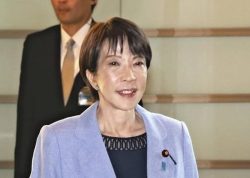
Japan Plans National Database to Track Foreign Ownership of Real Estate, Land as It Weighs New Rules
-

Up to 199,000 Deaths Estimated From Mega-Tsunami; Most Recent Occurrence Took Place in 17th Century
JN ACCESS RANKING
-

Tokyo Economic Security Forum to Hold Inaugural Meeting Amid Tense Global Environment
-

Keidanren Chairman Yoshinobu Tsutsui Visits Kashiwazaki-Kariwa Nuclear Power Plant; Inspects New Emergency Safety System
-

Imports of Rare Earths from China Facing Delays, May Be Caused by Deterioration of Japan-China Relations
-

University of Tokyo Professor Discusses Japanese Economic Security in Interview Ahead of Forum
-

Japan Pulls out of Vietnam Nuclear Project, Complicating Hanoi’s Power Plans



-250x167.jpg)
